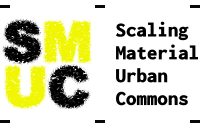ANNOUNCEMENT — now and future
announcement — past
Machine Teaching Commons / Teaching Machine Commons Symposium and Exhibition June 2024
Exhibition opening
June 19th 2024. 6 pm.
CIVIC space at FHNW Academy of Art and Design, Freilager-Platz 1, Basel
The exhibition, co-curated by Jaz Choi, presents key findings and outcomes of the Scaling Material Urban Commons project and puts them into relation with works by Xiaowei Wang, Dark Matter Labs, Superflux, 2050+ Architects, Nightshade and many more.
Symposium
June 20th 2024
AULA, 1st floor at FHNW Academy of Art and Design, Freilager-Platz 1, Basel
9:00: Arriving
9:30 — 10:00: Opening by Helen Pritchard (IXDM Head of Research)
10:00 — 11:00: Opening talk by Viktor Bedö
11:00–11:15 Break
11:15 — 12:45: Panel round 1 with Rebecca Fiebrink, Jaya Klara Brekke, Oona Morrows; moderated by Viktor Bedö
12:45 — 14:00: Lunch break
14:00 — 15:30: Panel round 2 with Xiaowei Wang, Eunji Kang, Ippolito Pestellini Laparelli; moderated by Jaz Choi
15:30 — 16:00: Workshop in the exhibition space
Panels will be held in a hybrid format and can be followed online (link TBA).
Contact
Academy of Art and Design
Institute Experimental Design and Media Cultures (IXDM)
Freilager-Platz 1
CH-4002 Basel
mail@smuc.kitchen
About SMUC
Scaling Material Urban Commons (SMUC) crafts imaginaries of urban futures that reconcile automation and predictive technologies with commoning- and care-based use of resources. SMUC uses speculative city-making to scale up the commoning of rescued food. It does so by prototyping a predictive algorithm-based system, dubbed Smuc.kitchen, that orchestrates the collection and drop-off of rescued food in Basel and London.
Abstract accepted at EASST-4S 2024
Paper accepted at DRS2024
Join the smuc.kitchen Field Test in April!
Collective Machine Teaching @ ThingsCon 2023
Workshop. Rotterdam. 15/12/2023
HackThePromise Festival
Panel discussion. Basel. 16/09/2023
DIT Apéro Riche (cancelled)
Social. Basel. 24/06/2023
Towards good enough prediction
Workshop. London. 22/06/2023
The aim of this hands-on workshop is to bring together London-based researchers (form institutions such as CUCR, Goldsmiths Design, HCI City, Design Innovation Loughborough) the probe mutual research interest in just, community-driven algorithmic urban futures.
Through creating data stories with the participants, the workshop addresses the problem space of unwieldy data from citizen sensing (Gabrys et al 2016), optimisation’s inherent drive to smoothen out individual differences in calculative processes (Powell 2021) and frictions in community-based machine teaching.
Alison Powell: Undoing Optimization
Guest talk. Basel / online. 11/04/2023
Alison Powell is Associate Professor in Media and Communications at the London School of Economics. Her work includes research about Joining Up Society and Technology for AI (JUST AI Network), investigating the possibility and consequences of explaining how algorithms work (Understanding Automated Decisions), or explroing how people make knowledge about the city through ‘data walking’.
‘Labelling Friction’ Workshop
Workshop. Basel. 15/12/2022
Inaugural Lecture Viktor Bedö
Lecture. Basel. 14/12/2022
Automation And Privacy Workshop
Workshop. Basel. Oct 12th 2022
Cards For Food Rescue Workshop 2
Workshop. London. Date TBA
Cards For Food Rescue Workshop 1
Workshop. Basel. June 20th 2022.
Symposium Growth x Sustainability
Workshop. London. June 2nd 2022
SMUC x Moth Cities
Publication. Basel/London. January 2022
SMUC x HvA Master Digital Design
Cooperation. Basel/Amsterdam. November 2021
Food rescue partners wanted
Call. November 2021
Project kick off
Update. Basel. September 2021
Contact
Academy of Art and Design
Institute Experimental Design and Media Cultures (IXDM)
Freilager-Platz 1
CH-4002 Basel
mail@smuc.kitchen
About SMUC
Scaling Material Urban Commons (SMUC) crafts imaginaries of urban futures that reconcile automation and predictive technologies with commoning- and care-based use of resources. SMUC uses speculative city-making to scale up the commoning of rescued food. It does so by prototyping a predictive algorithm-based system, dubbed Smuc.kitchen, that orchestrates the collection and drop-off of rescued food in Basel and London.
